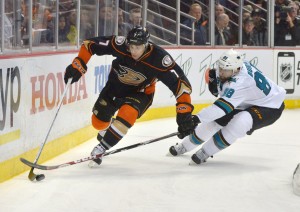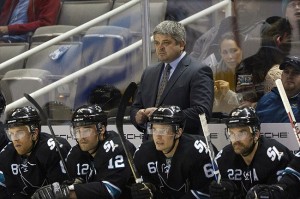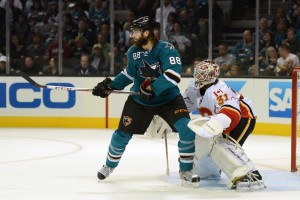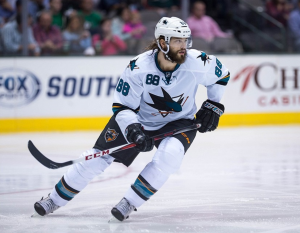
While last week’s exit interviews for the Sharks provided more questions than answers, there has been plenty of quality content to sort through. Certainly not the least of which was the very different responses from GM Doug Wilson and now former head coach Todd McLellan in their assessments of Brent Burns’ performance on the blue-line this year.
Wilson’s Words
While Burns finished with 60 points and was an All-Star this year, glowing reports of his overall play this season are just plain silly, and that is basically what Wilson delivered in his assessment. Despite the fact I prefaced my question noting that Burns spent time late in the season on the third defense pair, Wilson was nothing but complimentary. The GM said little more than, “I think Brent did a very good job. Not going to share all the ratings but he got the highest rating from Larry Robinson. To end up at an A- rating tells you a lot.”

Who was Wilson watching this season? An All-Star with 60 points sounds nice, but plus/minus falling from plus-26 to minus-9 on largely the same team personnel wise, goals-for percentage at even strength dropping from 64% to 47%, Corsi-for and Fenwick-for percentages lowering from 57.1% to 53.4%, are clear indicators of Burns being a much better forward five aside in 2013-14 than he was a defenseman at evens in 2014-15. The only reason he had 12 more points this season at defense than he did at forward a year ago is because he played 13 more games and played the whole year on the first power-play unit. As a forward in 2013-14 he played most of the year on the far less effective and less frequently used second unit.
Scoring 48 points in 69 games as a forward in 2013-14 is a 57 point 82 game pace. Last season though Burns only had 11 power-play points compared to 24 power-play points this year. If you add the difference (13 extra power play points) to last year’s 82 game pace and Burns would have had 70 points as a forward in 2013-14 had he been able to play all 82 and been on the first unit power-play. He clearly would have produced more total offense and tons more even strength goals this season had he played as a forward. Plus those enormous amount of poor defensive mistakes trying to read the opposing rush as a defenseman would have been completely eliminated. I prefaced the same question to McLellan last week, mentioning Burns was an All-Star but had some struggles defensively and the coach had the following answer:
McLellan’s Message

“It’s not easy to move back and forth. Burnsie played defense back there all year for the simple fact that in his mind he needed to know that was where he was going to be. I think he got better as the year went on. We saw his plus/minus numbers which I think are a poor indicator but at least they improved. He was one of the top offensive producing defensemen in the league. I think at times he was fairly evaluated by the media and at other times I think he was very unfairly evaluated.”
Certainly a positive spin but a much more critical grade than Wilson and Robinson’s. Those of us in the media were frequently criticizing Burns’ defensive mistakes all year long and McLellan indicated that at times we in the media were fairly evaluating Burns. “He got better as the year went on” indicates McLellan clearly wasn’t too happy with Burns especially at the beginning part of the season. Not sure about you readers out there, but if I had to guess a letter grade that McLellan would assign for Burns, it sounds like no better than a B-. If not some sort of C grade. Certainly not nearly as glowing of a report as Wilson gave.
Advanced Analysis

Burns was universally praised for how dominant of a forward he was last season. Fans, media, coaches, all gave A’s across the board. This year while some people apparently graded him an A, a lot of people graded him as a C or worse for some incredibly porous defensive play. Think about this for a moment, the Sharks controlled 53.4% of all shot attempts at even strength in 2014-15 with Burns on the ice. In other words they had the puck in the offensive zone for the majority of the time. However, despite the opponent only controlling 46.6% of the shot attempts, they somehow managed to score 53% of the goals at even strength with Burns on the ice. This means the opponents were scoring at an extremely high rate when they controlled the puck against Burns and the Sharks. “Franchise defensemen” which is what Wilson believes Burns to be, don’t get crushed that miserably when defending their own net.
In 2013-14, the Sharks controlled 57.1% of the shot attempts with Burns on the ice, and scored an even higher percentage of the goals (64%). Goals for was even higher than Corsi-for as a forward. This year goals for was significantly lower than Corsi-for as a defenseman. The extreme flip flop in advanced numbers is an indication that the Sharks were far worse off this year with Burns on the ice at even strength than they were the previous season. People within the Sharks organization want to associate his going to the All-Star game back on the blue-line as an indication he was awesome this season. That simply isn’t true.

The only reason he had a career year in points as a defenseman instead of a forward is because of the increase in power-play time and health. He would have had an even better career season as a forward at even strength this year playing 82 games as the point man on the top power-play unit. Burns playing forward (his natural position) and even having merely in house AHL puck movers like Matt Tennyson and Taylor Fedun (natural defenseman) take up Burns minutes on the back end would have made the Sharks a hell of a lot better this season. While it wouldn’t have solved all their problems, chances are they would have made the playoffs with this one position change alone.